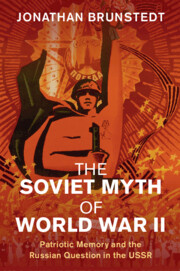Book contents
- The Soviet Myth of World War II
- Studies in the Social and Cultural History of Modern Warfare
- The Soviet Myth of World War II
- Copyright page
- Dedication
- Contents
- Figures
- Acknowledgments
- Abbreviations
- Additional material
- Introduction
- 1 Stalin’s Toast
- 2 Victory Days
- 3 Usable Pasts
- 4 Monumental Memory
- 5 Patriotic Wars
- Conclusion
- Bibliography
- Index
1 - Stalin’s Toast
Victory and the Vagaries of Postwar Russocentrism
Published online by Cambridge University Press: 24 June 2021
- The Soviet Myth of World War II
- Studies in the Social and Cultural History of Modern Warfare
- The Soviet Myth of World War II
- Copyright page
- Dedication
- Contents
- Figures
- Acknowledgments
- Abbreviations
- Additional material
- Introduction
- 1 Stalin’s Toast
- 2 Victory Days
- 3 Usable Pasts
- 4 Monumental Memory
- 5 Patriotic Wars
- Conclusion
- Bibliography
- Index
Summary
This chapter explores ideological production and commemoration in the late Stalinist era through the lens of the fledgling myth of victory in World War II. Specifically, the chapter pursues the afterlife of Stalin’s oft-cited toast to the Russian people in both Russian and non-Russian contexts to tease out its rather inconsistent and ambiguous connection to the official war narrative. Far from a consistent Russocentric ideological rubric, this chapter shows that the Stalinist leadership refused to commit to an exclusively Russocentric understanding of the war. Rather, it allowed an “internationalist” paradigm to coexist with its Russocentric counterpart in discursive tension throughout the era. As Stalin’s toast was eliciting mixed reactions, party ideologues shaped a divergent set of postwar narratives geared toward mobilizing local populations along contrasting ideological planes. So long as the core ingredients of victory – Stalin’s leadership, party guidance, the Soviet system, the unwavering heroism of the Red Army and citizenry – remained in place, the myth’s articulators were free to promote a range of competing narratives, from accounts emphasizing a homogenous collection of Soviet people bound latterly in “friendship” to those stressing Russian “elder brotherhood" and ethnic diversity.
- Type
- Chapter
- Information
- The Soviet Myth of World War IIPatriotic Memory and the Russian Question in the USSR, pp. 35 - 71Publisher: Cambridge University PressPrint publication year: 2021

